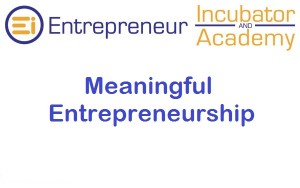August spotlight: Michelle Davidson
Michelle Davidson is one of the founding partners of Entrepreneur and Management Solutions. She started her career in the non-profit financial sector after completing her B.Com in Information systems at UCT.
Michelle has over a decade of experience with non-profits having assisted with many budgeting, planning and strategic sessions. She has a passion not only for the numbers but the people in these organisations. Her happy place is working with people, spreadsheets and strategic processes to improve current performance and profits.
Michelle has a huge vision of developing a business that is able to provide wall to wall services for the non-profit and small business. This vision is slowly coming into focus with the merge of her own business MD Business Solutions with the Entrepreneur Incubator in 2016 to create Entrepreneur and Management Solutions. Watch this space as Michelle plots out and executes her vision over the next few years to develop a strong business structure that will continue to serve businesses and business people well into the future.
Michelle is married to Richard and has a son in Grade 2 at Wynberg Boys. She has a passion for drawing, art and music and spending quality time with family and friends.








